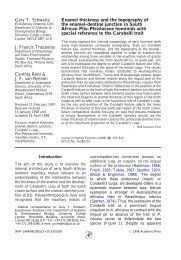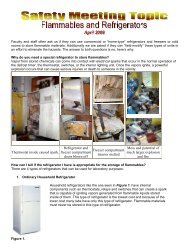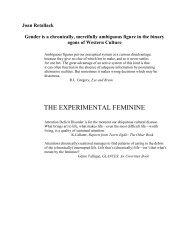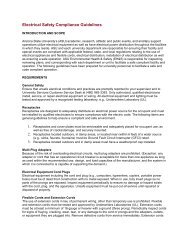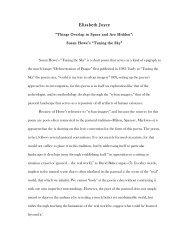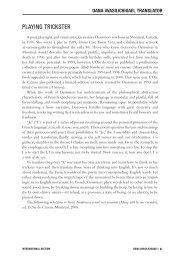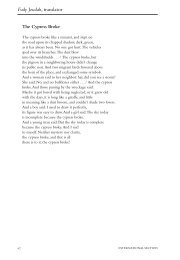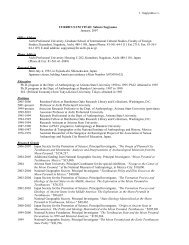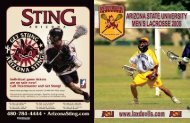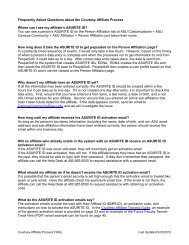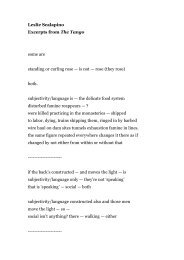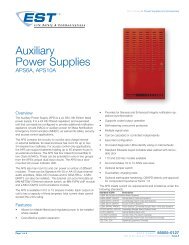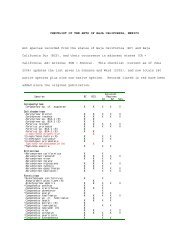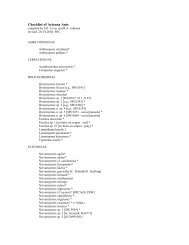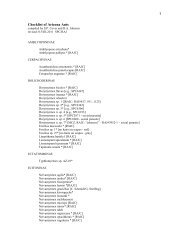Newsletter 12_7_06 rev - Arizona State University
Newsletter 12_7_06 rev - Arizona State University
Newsletter 12_7_06 rev - Arizona State University
You also want an ePaper? Increase the reach of your titles
YUMPU automatically turns print PDFs into web optimized ePapers that Google loves.
Clinical Updates cont.<br />
The New Partnership<br />
The Balsz Elementary School District No.<br />
31 (BELD) has entered a unique partnership<br />
with the Department of Speech and<br />
Hearing Science for providing state-of-theart<br />
speech-language services to district<br />
students and for training future speechlanguage<br />
pathologists (SLP).<br />
There is a severe shortage of qualified<br />
SLPs in <strong>Arizona</strong>. In even greater demand<br />
are SLPs who specialize in the needs of<br />
bilingual/bicultural individuals who are at<br />
risk of being under– or over-identified for<br />
special education services. This collaboration<br />
allows a member of the clinical faculty,<br />
Miriam Garlant, to provide regular<br />
speech-language intervention services to<br />
children at a designated elementary school.<br />
Ms. Garlant has public school experience<br />
as a bilingual SLP, an elementary school<br />
teacher, and has a bilingual/ESL endorsement.<br />
She provides specialized bilingual/<br />
bicultural services to the District and trains<br />
graduate students to evaluate and provide<br />
intervention services for ESL students.<br />
Each semester, Ms. Garlant supervises<br />
approximately six SLP first-year graduate<br />
students in the practicum placement. In<br />
groups of two, the six students spend one<br />
morning with<br />
Ms. Garlant providing services to BESD.<br />
The District will reap the benefit of a<br />
strong affiliation with one of the top training<br />
programs for SLPs in the country and<br />
ASU graduate students will gain experience<br />
in working with culturally and linguistically<br />
diverse students in a public<br />
school setting prior to their public school<br />
internship placement.<br />
Drama Camp<br />
The purpose of drama camp is to provide a<br />
fun, motivating environment for children<br />
with complex communication needs<br />
(especially those who use Augmentative<br />
and Alternative Communication Devices)<br />
to develop and practice their communication<br />
skills. The major focus of the camp is<br />
practicing and performing in a play but the<br />
campers also participate in a variety of<br />
other activities, such as art projects (e.g.,<br />
making props), games and MUSIC.<br />
This year another focus of<br />
the camp was for the children<br />
to expand their “Social<br />
Networks” by having experiences<br />
communicating with<br />
new people. This project<br />
included homework assignments<br />
to talk to new people<br />
and regular Communication<br />
“Scavenger Hunts” where<br />
the children went around in<br />
the Lattie Coor Hall Building<br />
talking to new people. Speech and Language<br />
Pathology Graduate students in the<br />
Department of Speech and Hearing Science<br />
run the camp along with a Music<br />
Therapy intern from the School of Music.<br />
This year we were treated to “Jack and the<br />
Beanstalk”. The play was dedicated to the<br />
memory of Aaron Otto, a former camper.<br />
Aaron’s mother wrote the following passage<br />
for us to include in our program:<br />
“Aaron couldn't speak to anyone but those<br />
who ‘understood’ him. .... he had so much<br />
to say and only a few very lucky people<br />
who took the time and had the heart to<br />
listen found out what he wanted to say...<br />
not with words but with his eyes and expressions.<br />
…just tell [the clinicians and<br />
students] that when they go into the work<br />
field and start helping these kids...<br />
PLEASE don't give up, keep at it! The<br />
results are slow, just be patient.”<br />
Audiology Clinic<br />
Page 10<br />
Clinical preparation of the AuD student is<br />
ever expanding and our clinical faculty<br />
provide a breadth of clinical services on<br />
campus. Kathy Wexler is our resident<br />
pediatric audiologist but she also provides<br />
diagnostic and intervention services to<br />
adults as well as children. When she is not<br />
supervising in the clinic she is busy collecting<br />
electrophysiological data for the P1<br />
study under the direction of Dr. Michael<br />
Dorman. Dr. Steve Maxwell, has significantly<br />
expanded our service delivery in the<br />
area of balance assessment by providing<br />
our students with invaluable ENG/VNG<br />
training. Dr. Maxwell also provides diagnostic<br />
assessment and rehabilitative audiology<br />
to adults. Dr. Ingrid McBride provides<br />
diagnostic assessments and rehabilitative<br />
audiology to both children and<br />
adults and oversees the popular Living<br />
with Hearing Loss Aural Rehabilitation<br />
class. Additionally, Dr. McBride places<br />
students in off-campus clinical rotations<br />
and in their 4th-year externship positions.<br />
An exciting new development is the establishment<br />
of a 4th-year externship position<br />
in our clinic which is open to students<br />
from AuD programs across the country.<br />
“Living with Hearing Loss—<br />
Problems & Solutions: Aural Rehabilitation<br />
Program<br />
The AR program offered through the<br />
clinic is now in its third year and still<br />
going strong. To date, we have had over<br />
200 patients complete the program. This<br />
eight-week aural rehabilitation program<br />
is geared for adults coping with hearing<br />
loss and their loved ones. The program is<br />
offered twice each semester and once<br />
during the clinic’s summer session. The



